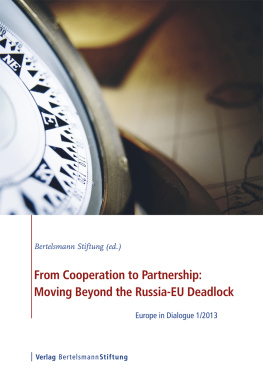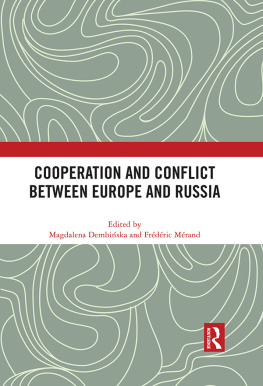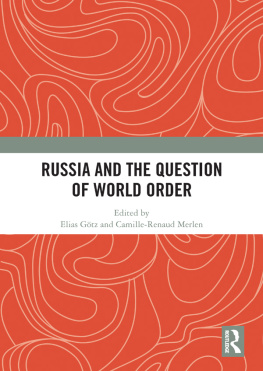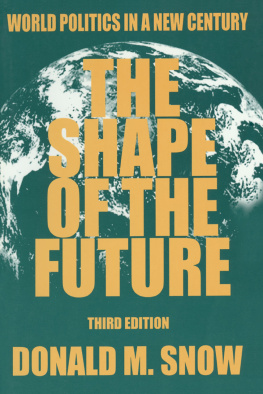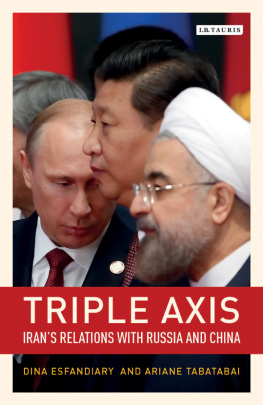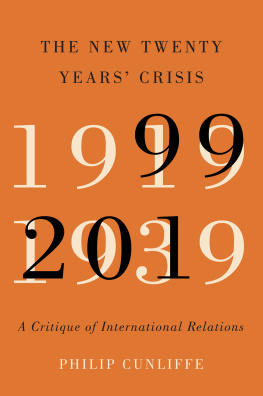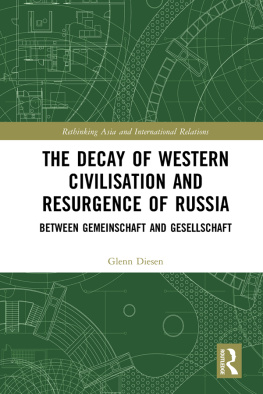Timofei Bordachev has filled cavernous gap in the study of European Security and global politics. Europe, Russia and The Liberal World Order is one of few enjoyable reads on the subject in recent years. By examining the intersection where national interests and an ideology with globalist pretentions meet. Using the example of relations between Russia and Europe after the Cold War the author shows how the nature and substance of international politics in general have been transformed. A recommended read for anyone interested in why the Post Cold War order unravelled so fast.
Asle Toje (PhD, Cantab.), Vice Chair of the Nobel Committee. Member of the Committee (appointed for the period 20182024)
What went wrong? This is the most frequently asked question when it comes to relations between Russia and Europe after the Cold War. Why shining expectations turned into such a dark alienation? Timofei Bordachev gives a unique perspective arguing that political failure of Common European Home derived from contradictions embedded in the Liberal World Order per se. This book is a brilliant proof that theory of international relations is not just an academic exercise, but a very important instrument of applied analysis. Truly fascinating reading!
Fyodor Lukyanov, Editor-in-Chief of the journal Russia in Global Affairs, Research Director of the Foundation for Development and Support of the Valdai Discussion Club
Why did Europe and Russia fail to build the broadly cooperative relationship they both aspired to after the end of the Cold War? In this ambitious work, Timofei Bordachev of the Higher School of Economics deftly draws on international relations theory to illuminate the practical consequences of decisions made in Moscow and Brussels that led to a parting of ways. In the process, he deepens our understanding of the post-Cold War period and makes a valuable contribution to IR theory, highlighting the vital role a balance of power plays in structuring and sustaining international institutions that are ostensibly founded on other principles.
Thomas Graham, Distinguished Fellow, Council on Foreign Relations
Europe, Russia and The Liberal World Order
This book analyses Russia-Europe/EU relations by exploring their practical essence and conceptualising them in terms of the main categories of international relations research. It argues that the liberal world order, established in Cold War days, whereby international relations are underpinned by a global balance of power and a highly institutionalised framework of international relations, thereby balancing power and morality, continued after the Cold War, with high hopes in the early 1990s for a new order of security and cooperation for all Europe, including Russia. It goes on to show how the liberal world order has broken down, one manifestation of this being the new conflict between Russia and Europe in recent years, a conflict resulting from the failure of European countries/the EU to acknowledge the actual balance of military, economic and political power, the lack of limits on the policy of European countries in terms of infringing on Russia's interests, and Russia's consequent revision, after 1999, of its policy of cooperation. Overall, the book provides huge insight into the nature of Europe-Russia relations.
Timofei Bordachev is Programme Director of the Valdai Discussion Club and Academic Supervisor of the Center for Comprehensive European and International Studies at the National Research University Higher School of Economics, Russia.
Routledge Contemporary Russia and Eastern Europe Series
89.Putin's Third Term as Russia's President, 201218 Putin's Third Term as Russia's President, 201218
J L Black
90.Soviet and Post-Soviet Sexualities
Edited by Richard C. M. Mole
91.De Facto States in Eurasia
Edited by Tom Hoch and Vincenc Kopeek
92.Czech Democracy in the New Millennium
Edited by Andrew L. Roberts with Stanislav Balk, Michal Pink, Marek Ryb, Peter Sp, Petra Svainov and Petr Voda.
93.Russia's Food Revolution
The Transformation of the Food System
Stephen K. Wegren
94.The Sense of Mission in Russian Foreign Policy
Destined for Greatness!
Alicja Curanovi
95.Soviet Films of the 1970s and Early 1980s
Conformity and Non-Conformity Amidst Stagnation Decay
Edited by Marina Rojavin and Tim Harte
96.Europe, Russia and The Liberal World Order
International Relations after the Cold War
Timofei Bordachev
Series url: https://www.routledge.com/Routledge-Contemporary-Russia-and-Eastern-Europe-Series/book-series/SE0766
First published 2022
by Routledge
2 Park Square, Milton Park, Abingdon, Oxon OX14 4RN
and by Routledge
605 Third Avenue, New York, NY 10158
Routledge is an imprint of the Taylor & Francis Group, an informa business
2022 Timofei Bordachev and Foundation for Development and Support of the Valdai Discussion Club
The right of Timofei Bordachev and Foundation for Development and Support of the Valdai Discussion Club to be identified as author of this work has been asserted by them in accordance with sections 77 and 78 of the Copyright, Designs and Patents Act 1988.
All rights reserved. No part of this book may be reprinted or reproduced or utilised in any form or by any electronic, mechanical, or other means, now known or hereafter invented, including photocopying and recording, or in any information storage or retrieval system, without permission in writing from the publishers.
Trademark notice: Product or corporate names may be trademarks or registered trademarks, and are used only for identification and explanation without intent to infringe.
British Library Cataloguing-in-Publication Data
A catalogue record for this book is available from the British Library
Library of Congress Cataloging-in-Publication Data
Names: Bordachev, T. V. (Timofe Vicheslavovich), author.
Title: Europe, Russia and the liberal world order : international relations after the Cold War / Timofei Bordachev.
Description: Abingdon, Oxon ; New York : Routledge, [2022] | Series: Routledge Contemporary Russia and Eastern Europe series | Includes bibliographical references.
Identifiers: LCCN 2021011739 (print) | LCCN 2021011740 (ebook) | ISBN 9781032046105 (Hardback) | ISBN 9781032069715 (Paperback) | ISBN 9781003204770 (eBook)
Subjects: LCSH: Russia (Federation)Foreign relationsEuropean Union countries. | European Union countriesForeign relations. Russia (Federation) | Russia (Federation).Foreign relations. | European Union countriesForeign relations21st century.
Classification: LCC DK510.764 .B67 2022 (print) | LCC DK510.764 (ebook) | DDC 327.4704dc23
LC record available at https://lccn.loc.gov/2021011739
LC ebook record available at https://lccn.loc.gov/2021011740
ISBN: [978-1-032-04610-5] (hbk)
ISBN: [978-1-032-06971-5] (pbk)
ISBN: [978-1-003-20477-0] (ebk)
Typeset in Times New Roman
by KnowledgeWorks Global Ltd.


